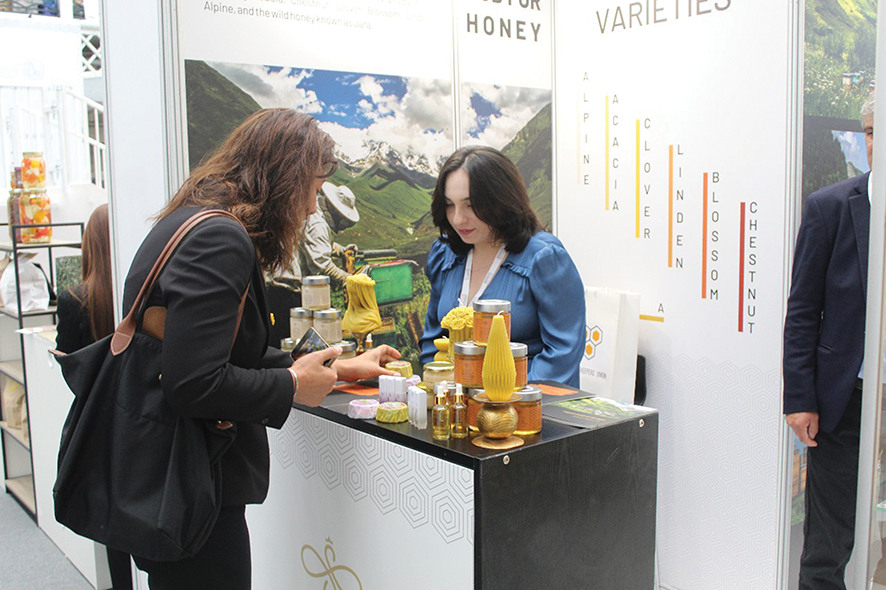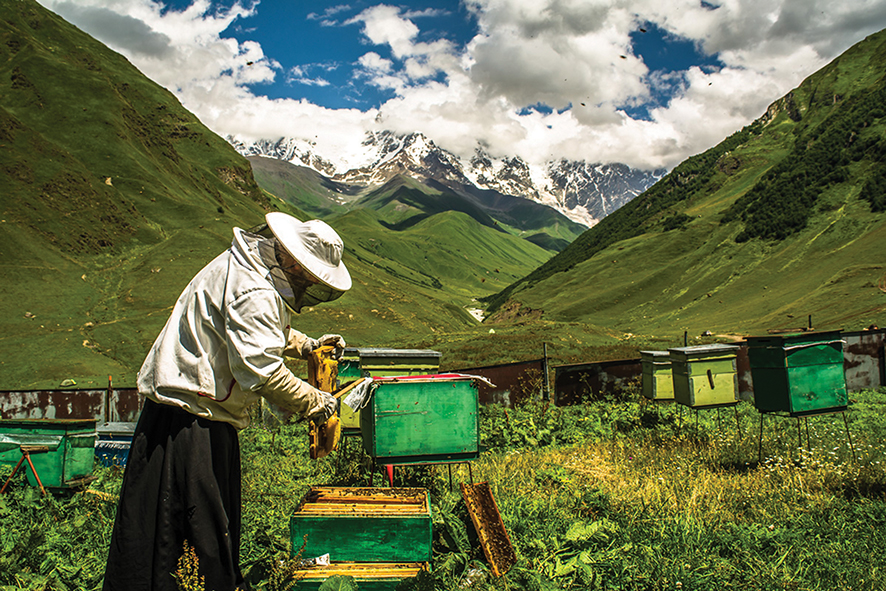Georgian Beekeepers Promote Honey Industry Locally and Abroad
Georgian beekeepers are striving to promote Georgian honey by increasing its popularity through the holding of annual events, raising awareness for the honey sector in Georgia, and showcasing the diversity and resilience of bees within the country.
Created in 2018, the Georgian Beekeepers Union is an ‘umbrella’ association that brings together more than 4,000 beekeepers across the country. The union includes 10 beekeeping associations and three commercial companies, all of which have their own areas of focus and goals within the industry.
Spotlighting Bees at the Tbilisi Honey Festival
Several honey businesses participated in Tbilisi’s Honey Festival in Mtatsminda Park from September 28 to 29. The festival, which was open to the public, allowed attendees to try honey from different businesses and see what creations could be made from it beyond the typical consumables. Products included shot glasses made from beeswax, candles, honeycomb, and honey-infused liquors. Each business also offered a honey tasting, and some even showcased a hive, where attendees could see the bees and their queens up-close. The abundance of honey and hives brought numerous visiting bees to the tables during the festival, but, according to one of the business owners, bees are not aggressive, nor do they target people when they have a food source- which at the Honey Festival was plentiful!

A Honey Business in the Spotlight: Rukhi Queen
Tamar Kvaratskhelia is the owner and director of the honey business Rukhi Queen. She started her business in 2019, but it wasn’t until 2020 that it was established as a brand, and in 2021 opened as a shop. At the time, she tells us, nobody was legally exporting honey from Georgia.
Rukhi Queen officially took off after she was invited to present at an exhibition in Doha, where she proved a sell-out even before the end of the event.
Rukhi Queen began as a personal export-focused business, but Tamar soon wanted to expand into retail. She discovered a location in Orbeliani Bazari that she “fell in love with” due to its tourist traffic. After renting the space for a while and recognizing a demand for more products, she decided to create a bee-based cosmetics line.
“Cosmetics were my first idea because we already had knowledge of using bee products in soaps and shampoos,” Tamar explains. Rukhi Queen now offers 15 certified cosmetic products, including soaps, scrubs, serums, essential oils, face masks, lip glosses, and lip scrubs, with a bee-based hair care line set to launch after the new year.
Tamar notes that while many other sellers use bee products like pollen, honey itself is often the least utilized in cosmetics. “Rukhi Queen’s beauty products tend to sell out much faster than our honey!” she adds.
The only exports Rukhi Queen does now are to the Gulf countries. Tamar explains that the culture of consuming honey and bee products is very high there.
“Sometimes, our customers buy 10 or 20 products at a time for themselves and as gifts for others,” she says.

Weather Challenges Affecting Exports
Last year, many regions in Georgia experienced significant rainfall, impacting both the harvest and the flavor of the honey. As a result, producers were unable to collect the usual quantities, leading investors to seek supplies from other countries. Now, Georgian honey producers are actively searching for new buyers, aiming to expand their markets beyond the Gulf countries.
“We’re trying to enter the giant European market,” she says. “The populations there are bigger than in the Gulf countries, and we really need countries that can buy larger amounts.”
Tamar has been a member of the Beekeepers Union since 2020. Eager to enhance her business, she saw the union as an excellent opportunity to connect with others knowledgeable in the industry. When she reached out to the union’s president, Aleko Papava, he was excited to see a younger person engaging with the honey sector.
Tamar explains, “Our grandparents and parents were the ones taking care of the bees. The union is looking for new generations to help grow and develop the industry. Without that, we can’t progress. Everything is changing—we have new medicines, technologies, and methods to work with.”
The Georgian Beekeepers Union has a varied mission. It checks the quality of different honey, upholds the standards of beekeeping within the country, trains beekeepers year-round, and gives treatments to rid diseases within bees. The Beekeepers Union also organizes meetings between beekeepers and hosts festivals twice a year. Tamar highlights the recent festival in September, which aimed to promote honey to local customers and raise awareness about the sector’s growth and achievements. She emphasizes that the union is actively working in various fields to advance Georgian beekeeping on a global scale.
Tamar notes that Union President Aleko Papava has made significant strides in collaborating with the Ministry of Environmental Protection and Agriculture. Four years ago, the Union had minimal influence within the ministry, but thanks to Papava’s efforts, the industry has gained attention. Since then, they’ve held multiple meetings with government officials, demonstrating positive results from the beekeeping sector.
In 2017, the United Nations established ‘World Bee Day,’ which Georgia celebrated for the first time this year in Mukhuri. The event brought together beekeepers at the Beekeeping Center in Zemo Svaneti. According to a report from ALCP2, the Georgian Beekeepers Union has petitioned the Ministry of Environmental Protection and Agriculture to designate Mukhuri as the permanent celebration site for World Bee Day, observed on May 20.
Looking ahead, Tamar expressed her hope for Rukhi Queen to enter the food industry in the coming years, emphasizing the potential of honey as a valuable food source.
Did you know…?
Georgia has a famous species of bee known as the Mountain Gray Caucasian Honeybee, which is said to have ‘extraordinary characteristics.’ This bee has the longest tongue among honeybee species, allowing it to reach parts of the flower others cannot, which adds different flavors to the resulting honey and increases productivity. The Mountain Gray has adapted over the years to work in various conditions, including extremely cold places and those that receive large amounts of rain. According to the Georgian Beekeepers Union, these characteristics, plus other attributes, have given the honeybees a strong name, and allowed them to be recognized in various international award exhibitions over the last decades, where they have won gold medals, including in Germany (1961), Romania (1965), and Russia (1971).

